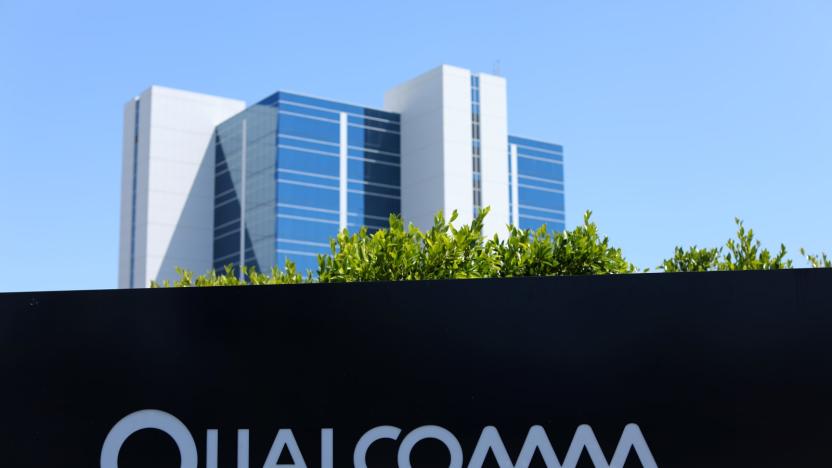FairTradeCommission
Latest

South Korea fines game studios over deceptive loot box odds
The uproar over in-game loot boxes is leading to some real financial penalties -- in South Korea. The country's Fair Trade Commission has fined Nexon, Netmarble and NextFloor a total of 1 billion won (about $945,200) for allegedly deceptive loot box promotions. The regulator asserted that each of the studios either hid poor odds for obtaining in-game items with the purchases, or else advertised odds that were out of step with reality. Nexon didn't reveal that the chances of obtaining some in-game items in Sudden Attack (a popular first-person shooter) was just 0.5 percent, for example, while Netmarble's Monster Taming pitched odds of 1 percent for a key creature when the actual chance of winning was as low as 0.0005 percent.

Qualcomm faces $774 million antitrust fine in Taiwan
Qualcomm's antitrust troubles aren't going away any time soon. Taiwan's Fair Trade Commission has fined the company the equivalent of $774 million over claims it abused its dominance of cellular chipsets in phones. The company effectively has a monopoly over CDMA, WCDMA (3G) and LTE chipsets, the Commission said, and it refuses to properly license its technology to others. Accordingly, the penalty will also have Qualcomm submit twice-a-year reports on negotiations with other companies.

South Korea makes it easier to get refunds for Android and iOS apps
If you've ever been burned by downloading a mobile app that you don't want or doesn't work, relief may be in sight... so long as you're in South Korea, at least. The country's Fair Trade Commission has ordered both Apple and Google to make their app refund policies more consumer-friendly. To start, Apple must make it easier to claim refunds on in-app purchases; if your kid goes wild buying in-game items, you should have an easier time getting your money back. Google, meanwhile, has to let developers set their own refund terms.

Taiwanese FTC fines Apple for interfering in iPhone handset and contract pricing
Taiwan's Fair Trade Commission has ruled that Apple's been naughty rather than nice this holiday week, fining it for 20 million Taiwan dollars (around $670,000) after it specified pricing to iPhone carriers. Once Apple sells distribution rights to an iPhone stockist, it has no right to dictate how much carriers and companies sell the devices for. According to the FTC's statement: "Through the email correspondence between Apple and these three telecom companies we discovered the companies submit their pricing plans to Apple to be approved or confirmed before the products hit the market." The iPhone maker will be able to appeal the ruling, although according to the WSJ, it could face a fine of up to $50 million Taiwan dollars if it doesn't comply.

Taiwan fines Samsung for astroturfing internet comments on its smartphones
Astroturfing (false grassroots) campaigns are usually reserved for promoting unpopular causes, but Samsung apparently disagrees. Taiwan's Fair Trade Commission has just fined the company NT$10 million ($340,333) for marketing its already successful smartphone line through fake internet comments. Samsung allegedly asked third-party contractor Peng Thai to write forum posts that praised devices, trashed competitors and downplayed bad news. The fine is almost trivial for a tech giant that makes billions of dollars in profit per quarter, but it may discourage others who would try similar dirty tricks -- besides, there are plenty of fans who would boost a product for free. [Image credit: Jussi Mononen, Flickr]

South Korea's FTC reportedly raids Google again over lack of cooperation
Google might be in trouble for how it handled an earlier raid by South Korean officials over antitrust concerns. Insiders claimed to AllThingsD that the country's Fair Trade Commission stormed Google's Seoul offices again on May 28th after the company allegedly stonewalled the investigation in suspicious ways. Among the accusations, Google supposedly deleted files and asked staff to work from home rather than face inquiries. The FTC's goal was still to answer complaints from local search firms Daum and NHN that Google was unfairly making it difficult to use a non-Google search engine in Android. Google still says it's cooperating with regulators, but the assertions if they're accurate would paint a different picture. They certainly don't alleviate pressure in the US over similar subjects.

Report: HP's South Korean offices raided over alleged price fixing
Korea Times is a publication that isn't shy of the odd bold statement and today it's claiming that HP's South Korean offices were raided on suspicion of price-fixing deals made with IBM and Oracle. The country's Fair Trade Commission seized documents, computer records and questioned employees over alleged price-rigging on public-sector contracts. A company spokesperson said that the visit was routine, while FTC officers refused to comment about ongoing matters, but what is clear is that if any wrong-doing is found, the case will be turned over to prosecutors with the aim of commencing criminal proceedings for those responsible.

Qualcomm competitors cry foul in Korea
We all know that Qualcomm likes to play up its market dominance everywhere possible -- and we also know they've taken some heat for it in Europe -- so it comes as little surprise to us that would-be CDMA competitors in the South Korean market are raising a fit. Texas Instruments and Broadcom have appealed to South Korea's Fair Trade Commission, alleging unfair practices by Qualcomm in bundling its CDMA chipsets with application processors. Presumably, the argument is that manufacturers should be allowed to mix and match chipsets without taking a hit on cost and without losing their relationships with suppliers, and since Qualcomm lays claim to portions of virtually every wireless standard -- not just IS-95 and CDMA2000 proper -- the implications of this are fairly far-reaching. Qualcomm's Korean offices have been raided by investigators in the past on similar allegations so we're not terribly confident this tussle will change their attitude, but we can dare to dream.


